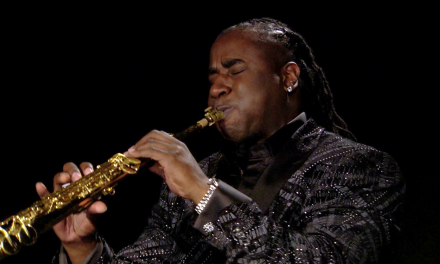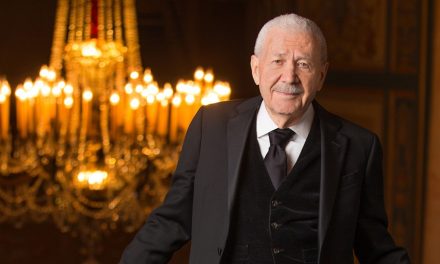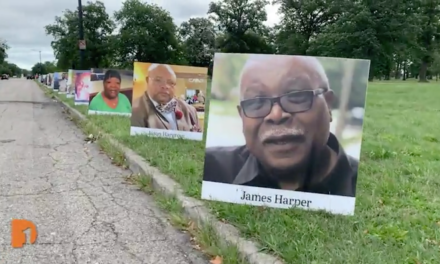Stephen Henderson: Welcome to American Black Journal. I’m Stephen Henderson. Each year thousands of teenagers and young adults get an opportunity to work during the summer through the Grow Detroit’s Young Talent program. For some, it’s the first time they’ve been exposed to the workplace. For others, it’s a chance to build their work readiness skills and gain experience in their chosen career fields. Meanwhile, employers are being introduced the next generation workforce. Here to tell us more is Jason Lee. He’s the executive director of Grow Detroit’s Young Talent along with employer Shawna Johnson Norfolk and program participant Akira Wright. Thanks for being here.
Jason Lee & Shauna Norfolk: Thank you for having us.
Stephen Henderson: So this is the third year of Grow Detroit’s Young Talent, is that right?
Jason Lee: So yes so Grow Detroit’s Young Talent we’ve historically had a summer youth program in the city of Detroit. But under Mayor Dugan’s leadership he’s adopted Grow Detroit’s Young Talent as one of his pillars in the community. And the program went from 2000 young people to 5000 under Mayor Duggan’s leadership. And this year we’re serving over eight thousand young people in the city of Detroit.
Stephen Henderson: Right. And the importance of that program. We can’t sort of overstate that. You think about the things that lurk for trouble for teens in the city in the summer. This is a primary way of redirecting them of saying ‘Hey, here’s something for you to do that’s not just not dangerous. It’s something productive. It’s going to help you now, it’s gonna help you in the future’.
Jason Lee: Absolutely. I think that everyone recognizes their first employment opportunity, getting that first paycheck.
And what Grow Detroit’s Young Talent is doing beyond just giving kids something to do is giving them an opportunity to earn that first–that first check. As the mayor’s summer youth program, we are providing tremendous opportunities for Detroit residents 14 to 24 to participate in the workforce and be a contributor to Detroit.
Stephen Henderson: Yeah yeah. You’re one of the employers to participate. Tell us about your business and about your experience with these young people.
Shauna Norfolk: Yes I am I’m an employer. My company is Be Legacy Solutions and our goal is to work with growing Detroit young talent is to employ young people give them time readiness skills also give them the opportunity and the ability to have some hands on training. Anything from attire, interviewing skills, and they also have had an opportunity to do some site visits with some local churches at 36th District Court. And so our goal is really to prepare them for the opportunities that lie ahead.
Stephen Henderson: What’s what’s the nature of the business that you.
Shauna Norfolk: The nature of the business is basically training and coaching and personal development.
Stephen Henderson: Yeah yeah and what’s the response you get from from the young people?
Shauna Norfolk: The response from the young people was very positive in the beginning. You know they’re a little to it because they don’t know what to expect. It’s not a regular working environment as they would expect. And so we come in and we do a lot of team building a lot of networking and then there are some assessments of their strengths and their talents. So it was unlike anything that they’ve had before. But naturally as we progress they progress and they improve over time.
Stephen Henderson: And how long has your business been participating in–
Shauna Norfolk: This is my first year participating with Grow Detroit’s Young Talent.
Stephen Henderson: Yeah. So you’ll come back next summer, you think?
Shauna Norfolk: Hopefully they’ll have me back to come back and continue to develop our young talent in the city of Detroit because it’s very important that we have a product as well to send out into the city and to other states across the nation. So my goal is to help do that.
Jason Lee: Yeah and what Be Legacy is providing is what we call it an industry led training opportunities. So, we have students in a very diverse employment range of opportunities. And so whether it’s working at a company, whether it’s in automotive or one of the companies that downtown in the city of Detroit or even a small business we’re giving kids diverse experiences and in alignment with their skill sets are also their needs and interests. Yeah so Be Legacy’s providing tremendous opportunities for get kids additional foundation so kids are essentially getting paid to learn about themselves. So that’s a one of our newer initiatives for 2018.
Stephen Henderson: Yeah yeah. So, Akira, you’re one of the participants in Grow Detroit’s Young Talent this summer. Tell us what you did and how you found it.
Akira Wright: Well, what I did. Her program helped me learn more about myself and get life. I knew my strengths; we had a strength finder. So I knew my strengths, I just didn’t know how to use them. And through the program I learned how to use my strengths, like how to be a better leader because you can you can be a leader, but that don’t you’re a good leader. I learned how to be a better leader and just a positive person overall. Like even if I wasn’t getting paid, I would still do her program. Her program is so amazing like I think it should be a year-round.
Stephen Henderson: So, what year are you in school?
Akira Wright: 2019, I’m a senior now. .
Stephen Henderson: OK now you’re gonna graduate in the spring. Talk about how this has framed for you the way you think of your work life after high school or after college. Has this really sort of helped you helped you decide what you’re interested in. Honestly, just doing this program like the career options are endless. Like we’ve just seen a judge, and she was so confident like very confident. And I was like, ‘I want to be a judge’, but then we saw a psychologist before that and I’m like I want to be a psychiatrist. Like I want to be a motivated and I want to be a motivating speaker. I want to be like–I want to be a entrepreneur just like the options are endless.
Stephen Henderson: Yeah yeah. And the idea that this work experience sort of opens up those options and sort of the idea behind it is the more you are exposed to things the more curious you might be about other–.
Akira Wright: It did teach me like that I want to work with people; like I like networking and the CAP program also taught me about networking. So this is just like both programs were just so amazing.
Stephen Henderson: The CAP program she’s mentioning is something new you have with– .
Jason Lee: Yes absolutely. So we’re really excited this year.
We partnered with Detroit Public Schools Community District and also at the United Way to create what we call the CAP program which is the Career Academy Program. Looking at the lens and other urban communities and other youth employment programs, there’s been a push for us to have a year-round work readiness program. So this is a pilot. We’ve worked with five Detroit Public School Community District’s high schools. Cody, Randolph, Osborn, Western International, and Ben Carson. And we picked a segment of students participate in that group. They are receiving year-round work readiness support as well as a career specialist to kind of support them throughout their work pathways and also removing any barriers that may be impeding them from an academic perspective also. So, Akira was part of our group of Ben Carson. And you know we kind of walked through the process of becoming a an employee through GDYT. We provided additional levels of work readiness training in addition to that we also provided what we call work readiness behavioral health awareness training through a partnership [with] Detroit Mental Health Authority. So over 1500 young people who participated in GDYT received what we call behavioral awareness training, which we recognize there are some obstacles that many people are facing that are preventing them from being either employed or maintaining employment. So the training is becoming a critical component of our work moving forward. When you are looking to hire people your business. Talk about some of the things that you see are lacking here in the city of Detroit that maybe made up for by programs like this.
Shauna Norfolk: One of the things that I see not necessarily lacking but needs improvement leadership and our young people need to know and be taught that they are leaders and that they can be leaders. And one of the other things is identifying what are their strengths. And that’s one of the first things they do when they come into the program because they know they have talent. They know they’re really good at things. But how do I harness those and put those on a pathway so that I can do what I need to do and not feel necessarily like work. So understanding what your strengths are and not focusing on only on the weaknesses, I think, is very helpful for our young people so that they don’t they don’t feel so defeated every time something needs to improve, and so they can start from a place of leverage because they know what they’re good at. And the ability to lead–to walk into a room and be a leader and understand and make connections and networking you know this is you know the the social media age. So some of that high touch has been lacking and so one of the things that we do in the program is we force the young people to interact with each other and get to know each other.
Stephen Henderson: That’s interesting outside of social media. Face to face which a lot of young people are not really interested right.
Shauna Norfolk: They are not they are not. But the first day when they walked in I told them you all will become a family at the end of the six weeks, and you know we’re going to put the phones down and just engage with one another just learn small things about each other because we’re all humans and we all have a lot of similarities and so they’ve taken that to a new level.
Stephen Henderson: I’ll bet they have talk about how this fits in with the work that you do in school. You’re at Ben Carson, is that right? Does this dovetail nicely with what they’re trying to prepare you for?
Akira Wright: Yes like basically, they teach her–both programs teach critical thinking skills and in school, you’re going to need that. Also, she got us ready for like, filling out the basic information for college and stuff that would be like stuff that school don’t teach–.
Stephen Henderson: That they’re not going to make sure that you know how to do, right?
Akira Wright: Yeah.
Stephen Henderson: Are you thinking about applying to college for the next year? And so this helped out.
Akira Wright: Yes.
Stephen Henderson: Talk about into the future Grow Detroit’s Young Talent. This has grown a lot over the last three years. What else is on tap?
Jason Lee: So I think that we’re going to see continued partnership with industry led training opportunities as well as working with the leading companies that are here in the city but also with small businesses small and medium sized businesses. We did a partnership with Motor City match and we provided an intern to the Motor City match winners for this year. And it was a tremendous experience as we talked to Motor City fashion agencies that are working with businesses that are trying to either grow here in Detroit or be here, the conversation around talent continues to come up. So this is an opportunity to for businesses to get a insight into what type of talent is here and meet people like Akira and actually give them exposure to those opportunities for future careers.
Stephen Henderson: Yeah, and the pipeline for this, does it flow through DPSCD and other schools for the program?
Jason Lee: We had over 13,000 young people apply for the program for internship opportunities this summer and it is a cross-section of all of Detroit. To qualify for Grow Detroit’s Young Talent. There’s two simple factors: you have to be a Detroit resident and be between 14 and 24 years of age.
Stephen Henderson: Ok, ok, Right. So you’re getting all kinds of people coming through.
Jason Lee: Absolutely. So we’re going to do some strategic planning moving forward and look at how do we continue to have a model that’s relevant to the community that is important to the business community. And we’ve received tremendous amount of support from business and the philanthropic community here in Detroit. We are a very generous community that believes in the young people and its future.
Stephen Henderson: OK, well, congratulations on all the good work, and congratulations, Akira, on a successful productive summer. I didn’t have many of those when I was a teenager, so, you’re ahead of the game. Thanks for being here.
Jason Lee: Thank you.
For the latest on American Black Journal, click here ![]()
Featured Image: Spirit of Detroit,Photo by Davis Doherty via flickr.com cc 2.0





